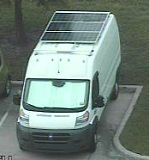TL:DR: I saw a set of cheap panels with weird specs at Home Depot. I bought some to experiment on and to use as portables to augment my mounted solar.
Home Depot is selling 200w of panel for $114. That’s $0.57/Watt. Not amazing compared to used panels (typically $0.33/Watt) but HD is all over the place and has free ship-to-store.
It also comes with mounting brackets and one of those single-stage PWM controllers. I’m not bagging on that kind of controller, but it’s not a great fit for this particular set of panels.
#THE CATCH
The panels are a weird design, apparently 24 cells in series. Normal “12v nominal” panels have 36 in series for ~18Vmp. These have a Vmp of 12.0v, so I think we would call them “8v nominal”.
This makes them practically unusable in parallel for charging lead or LiFePO4.
You could run the panels in series on the PWM controller since it has a 50v input max and the series Voc would be 30v. But, due to the way PWM works the panels would be running at in the 14v range at the most. This is way, way off the 24.0Vmp of the series array. I’d expect a max harvest of ~120w with that kind of setup. If these were normal panels in parallel and on PWM I’d expect a max of ~160w. We can go into the math on that if anyone wants.
The best case scenario IMO would be to run the panels in series with an MPPT controller. This would get us closer to ~170w max harvest.
some other thoughts:
- The panels might work well enough in parallel for 3S Li-NMC because of that chemistry’s lower voltage
- HD has a 10% discount program for veterans if you provide them with a bit of documentation.
Re: this post and “cheap portables experiment”:
I use the Powerwerx Panelpole outlets inside my van, but on the outside the “weather tight cover” failed to stay closed and would frequently pop open, exposing the port to weather.
I put it under a secondary cover and used it for my outside DC outlet, and replaced my external solar panel outlet with a CNLINKO LP-28 2-Pin IP67 Waterproof Connector rated up to 50A.
I did that so if I leave my external panels outside overnight, I didn’t have to worry if an unexpected rain storm gets the outlet wet.
We have very little open room in our van, so I spent stupid money on a compact 400W folding solar panel for “van roof in shade” and “need extra power” days.
I put it under a secondary cover and used it for my outside DC outlet, and replaced my external solar panel outlet with a CNLINKO LP-28 2-Pin IP67 Waterproof Connector rated up to 50A.
That connector looks interesting. It addresses one of my unstated concerns, the panel wires pulling down on the connector. This one looks like it has enough “neck” to relieve the strain. If I were doing the van again I’d mount all the inlets in one place under a secondary cover as you describe.
Is there a good online tool for calculating the cosign of solar Zenith so I can know how much solar my my panels could be making in ideal conditions? I see that you’ve used it in your blog.
I’ve found these Android apps useful:
- Trail Sense and it’s Solar Panel Aligner tool (given a time length or all day, calculate and assist alignment of panels to maximize production)
- RV Solar Forecast to see theoretical maximum possible
- Sun Surveyor to see where I can put my portable panels to get the maximum light without shading



